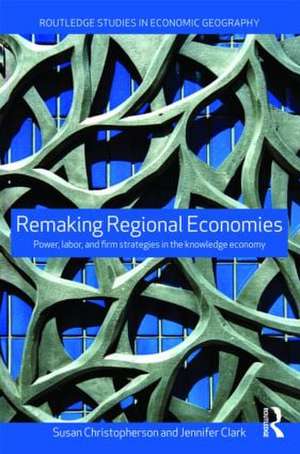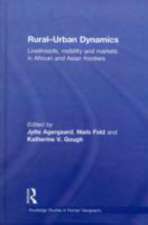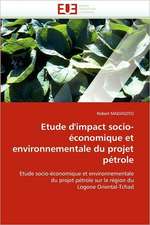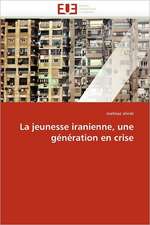Remaking Regional Economies: Power, Labor and Firm Strategies: Routledge Studies in Economic Geography
Autor Susan Christopherson, Jennifer Clarken Limba Engleză Paperback – 24 mar 2009
Since the early 1980s, the region has been central to thinking about the emerging character of the global economy. In fields as diverse as business management, industrial relations, economic geography, sociology, and planning, the regional scale has emerged as an organizing concept for interpretations of economic change.
This book is both a critique of the "new regionalism" and a return to the "regional question," including all of its concerns with equity and uneven development. It will challenge researchers and students to consider the region as a central scale of action in the global economy, and at the core of the book are case studies of two industries that rely on skilled, innovative, and flexible workers - the optics and imaging industry and the film and television industry. Combined with this is a discussion of the regions that constitute their production centers. The authors’ intensive research on photonics and entertainment media firms, both large and small, leads them to question some basic assumptions behind the new regionalism and to develop an alternative framework for understanding regional economic development policy. Finally, there is a re-examination of what the regional question means for the concept of the learning region.
This book draws on the rich contemporary literature on the region but also addresses theoretical questions that preceded "the new regionalism." It will contribute to teaching and research in a range of social science disciplines and this new paperback edition will also make the book more accessible to students and researchers in those disciplines, those individuals who will influence the re-structuring economies of the 21st century.
| Toate formatele și edițiile | Preț | Express |
|---|---|---|
| Paperback (2) | 408.74 lei 6-8 săpt. | |
| Taylor & Francis – 24 mar 2009 | 408.74 lei 6-8 săpt. | |
| Taylor & Francis – 21 ian 2016 | 416.22 lei 6-8 săpt. | |
| Hardback (2) | 1000.13 lei 6-8 săpt. | |
| Taylor & Francis – 31 mar 2016 | 1000.13 lei 6-8 săpt. | |
| Taylor & Francis – 4 oct 2007 | 1054.58 lei 6-8 săpt. |
Preț: 408.74 lei
Nou
Puncte Express: 613
Preț estimativ în valută:
78.21€ • 81.67$ • 64.58£
78.21€ • 81.67$ • 64.58£
Carte tipărită la comandă
Livrare economică 15-29 aprilie
Preluare comenzi: 021 569.72.76
Specificații
ISBN-13: 9780415551281
ISBN-10: 0415551285
Pagini: 192
Ilustrații: 8 black & white illustrations, 6 black & white tables, 8 black & white line drawings
Dimensiuni: 156 x 234 x 10 mm
Greutate: 0.28 kg
Ediția:1
Editura: Taylor & Francis
Colecția Routledge
Seria Routledge Studies in Economic Geography
Locul publicării:Oxford, United Kingdom
ISBN-10: 0415551285
Pagini: 192
Ilustrații: 8 black & white illustrations, 6 black & white tables, 8 black & white line drawings
Dimensiuni: 156 x 234 x 10 mm
Greutate: 0.28 kg
Ediția:1
Editura: Taylor & Francis
Colecția Routledge
Seria Routledge Studies in Economic Geography
Locul publicării:Oxford, United Kingdom
Public țintă
PostgraduateCuprins
Section 1: Shaping the Regional Project 1. Introduction 2. Firm Strategies: Resources, Context, and Territory 3. Labor Markets and the Regional Project Section 2: Case Studies 4. The Evolution of the Optics and Imaging Industry 5. Runaway Production: Media Concentration and Spatial Competition Section 3: Learning Regions and Innovation Policies 6. The Paradox of Innovation: Why Regional Innovation Systems Produce so Little Innovation (and so Few Jobs) 7. The Learning Region Disconnect 8. Remaking Regions: Considering Scale and Combining Investment and Distribution
Notă biografică
Susan Christopherson is professor in the Department of City and Regional Planning, Cornell University.
Jennifer Clark is an assistant professor in the School of Public Policy, Georgia Institute of Technology.
Jennifer Clark is an assistant professor in the School of Public Policy, Georgia Institute of Technology.
Recenzii
"...this book makes a highly significant contribution to the literatures on corporate strategy, labour markets and regional development, offering an oftentimes withering critique of prevailing orthodoxies as it progresses." -- Professor Neil Coe, University of Manchester, UK (reviewed in the Journal of Economic Geography)
"Christopherson and Clark's book is a wake-up call. It does not provide all the answers, and neither should it. It is a call for new thinking - well crafted and provocative and well supported by empirical research. It has the potential to be a turning point in new regionalist thinking and urgently needed policy development." -- Professor Michael Taylor, University of Birmingham, UK (forthcoming in Regional Studies)
"Christopherson and Clark credit several planners and geographers for introducing the principles of distributive regionalism, but in this book, they provide a new conceptual basis for it-their answers to the questions of actors, agency, and power." -- Professor James Harrington, Department of Geography, University of Washington, USA (reviewed in Economic Geography)
"…the empirical detail and breadth of discussion is nuanced, convincing, and worth reading. The underlying message is that SMEs compete with their larger counter parts in terms of access to critical factor markets and inputs." -- Professor Alan MacPherson, Department of Geography, University at Buffalo - The State University of New York, USA (published in Growth and Change)
"Given the power and timeliness of these arguments, this volume deserves a multi-disciplinary and multi-level academic, as well as an extensive policy-making, readership." -- Journal of Economic Geography
"These empirical studies are based on a rich and wide literature on the global economy and the region: which makes it easy to agree that the book is both interesting and insightful for a range of students and researchers of the social science disciplines. ...Certainly, it is of value for buying and reading!" -- Katariina Ala-Rämi, Department of Geography, University of Oulu. (published in Economic Geography Research Group Book Reviews)
"Christopherson and Clark's book is a wake-up call. It does not provide all the answers, and neither should it. It is a call for new thinking - well crafted and provocative and well supported by empirical research. It has the potential to be a turning point in new regionalist thinking and urgently needed policy development." -- Professor Michael Taylor, University of Birmingham, UK (forthcoming in Regional Studies)
"Christopherson and Clark credit several planners and geographers for introducing the principles of distributive regionalism, but in this book, they provide a new conceptual basis for it-their answers to the questions of actors, agency, and power." -- Professor James Harrington, Department of Geography, University of Washington, USA (reviewed in Economic Geography)
"…the empirical detail and breadth of discussion is nuanced, convincing, and worth reading. The underlying message is that SMEs compete with their larger counter parts in terms of access to critical factor markets and inputs." -- Professor Alan MacPherson, Department of Geography, University at Buffalo - The State University of New York, USA (published in Growth and Change)
"Given the power and timeliness of these arguments, this volume deserves a multi-disciplinary and multi-level academic, as well as an extensive policy-making, readership." -- Journal of Economic Geography
"These empirical studies are based on a rich and wide literature on the global economy and the region: which makes it easy to agree that the book is both interesting and insightful for a range of students and researchers of the social science disciplines. ...Certainly, it is of value for buying and reading!" -- Katariina Ala-Rämi, Department of Geography, University of Oulu. (published in Economic Geography Research Group Book Reviews)
Descriere
This book is both a critique of the "new regionalism" and a return to the "regional question," including all of its concerns with equity and uneven development. It will challenge researchers and students to consider the region as a central scale of action in the global economy



























